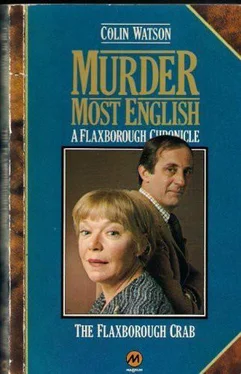“No joy?”
“He can see no reason for what he calls impugning the judgment of a competent and highly respected physician. That’s what he thinks his order for a P.M. would amount to.”
Malley took an experimental suck at his pipe and looked again in the bowl. “I was rather afraid you’d not be able to convince him.”
“Evidence—give me evidence, he says, that a crime’s been committed. But, God almighty, the only evidence we can ever hope to find is in that bloke’s belly. So what am I supposed to do?”
“Difficult,” said Malley, between puffs. “Pity there can’t be a little misunderstanding. I mean, Heinie would be in there filleting before anyone could stop him, once he got the word...”
“Oh, no!” Purbright held up his hand. “You can stop thinking along those lines, Bill. Pirate autopsies are definitely out.”
“What are you going to do, then?”
Purbright lay back in his chair and stared disconsolately at the wall. For a long time, he said nothing. What he did murmur at last made sense neither to the sergeant nor to himself.
“ ‘The fur is darker’.”
Chapter Seventeen
“I believe you have a Mr Brennan staying here, I should like to see him, please.”
The girl with the black fringe and a deep absorption in a magazine reached in slow motion for the house phone without looking up. “What name, madam?”
“Mr Brennan.”
“No, madam— your name.”
“My name is Miss Teatime.”
The girl set a plump white finger-end to guard the last word she had read, and peeked suspiciously through her fringe. Then, with the same hand that held the phone, she contrived to push home one of the switchboard plugs.
“There’s a lady in reception to see you, sir. She says her name is Miss Teatime.”
The girl listened, looking fixedly at the visitor.
“Very good, sir.”
She removed the plug, seated the phone, and made rendezvous with the waiting finger.
“Room twenty-seven, madam.”
Miss Teatime walked to the lift.
On the second floor, the door of twenty-seven already stood open.
Brennan, who now wore a brown suit that made him look bulkier than when she had seen him last, was on the threshold. He watched Miss Teatime’s approach along the corridor with an expression of curiosity, interrupted occasionally by a downward glance at the progress of something he was doing with his hands. As she got nearer, she saw that he was peeling an apple. He managed it very expertly so that the peel hung unbroken in a long green and white spiral which gently rose and fell as the apple turned beneath the knife.
“Good evening, Mr Brennan.”
He made a short bow, saying nothing, and stood back from the doorway.
Miss Teatime entered the room.
“We have met, you know.”
“Yes. Yes, of course.”
He let fall the appleskin coil neatly into an ornamental waste-paper tub beside the fireplace. The pocketing of the penknife was the conclusion of a single sweeping motion that brought the back of the blade against his thigh, snapping it shut. All his actions, Miss Teatime thought, would be like that—accurate, economical.
“Please...” He pointed to a chair.
She sat. Brennan remained standing by the table, on which he had laid his peeled apple on a saucer. He regarded her with polite expectancy.
As Miss Teatime removed a pair of light fawn gloves, she made a quick survey of the room; not inquisitively, but in the manner of a well-bred guest sizing up an agreeable situation. She saw that it was not a self-contained room, with a bed, like most of those at the Roebuck, but one from which two doors led to other apartments, presumably bathroom and bedroom. The carpet, a blue Wilton, was comparatively new, and the furniture included an antique lacquered cabinet, a pair of good chairs and a small bureau in reproduction Chippendale style. A big console television set supervised the room from one corner. By Flaxborough standards, it was all rather grand.
“And what can I do for you, Miss Teatime?”
She turned upon him her full attention, graced with a friendly smile.
“My errand will probably surprise you, but the fact is that I have come to make application for a grant.”
He frowned. “I don’t think I quite...”
“No, of course not. You cannot be expected to understand until I tell you who I am, can you? I am, so to speak, Moldham Meres Laboratories. That is to say, I am the company’s managing director—not,” she added hastily, “that I would like you to think of me as a tycoon or anything of that kind; we are a small and highly specialized concern, and it just happens that major responsibility has fallen upon me because of my long experience—through social work, you know—of the needs of elderly people. I do not need to remind you, of course, that the geriatric field is the area to which Moldham Meres Laboratories make particular contribution.”
“I can scarcely be reminded,” said Brennan, “of something I wasn’t aware of in the first place. I’m afraid I have never heard of these laboratories of yours.”
Miss Teatime looked shocked, but only for an instant. She good-humouredly wagged an admonitory finger.
“Now, Mr Brennan, we must not allow commercial rivalry to dictate our attitudes, must we? Human welfare is our common concern. Let us not pretend blindness to each other’s existence as workers towards that end.”
“I have not heard of your firm,” Brennan repeated. “And I am at a loss to understand what you said earlier about your purpose in coming to see me. A grant? What grant? How can you imagine that I have anything to do with grants?”
“You are the representative,” Miss Teatime resumed patiently, “of the West German drug house of Elixon, are you not?”
“Certainly.”
“And Elixon entertain high hopes that the product they allow to be made under licence here and marketed as ‘Juniform’ will prove a very valuable aid to geriatrician’s.”
“I would rather not discuss my firm’s products otherwise than with professional people, if you don’t mind.”
“Oh, but I am not discussing them. I stated a fact which I assume to be available to anyone who cares to read the medical press.”
“Is that where you heard about ‘Juniform’?”
“No.”
“Where, then?”
“You forget, Mr Brennan. We are fellow toilers in the vine-yard of human advancement. The only difference is that whereas your remedies are drawn from the retort and the centrifuge, mine rise directly from the earth.”
“Very picturesque.”
“Yes, but allow me to continue what I was saying. This ‘Juniform’, if it lived up to its promise, could be a tremendously significant drug. As I understand your firm’s admirably restrained claims, ‘Juniform’ actually holds back the effects of old age.”
“That is nowhere stated by us.”
“Not in those words, perhaps. ‘Inhibits the onset of cellular modifications associated with the ageing process.’ That seems to me to be very much the same thing. No matter—what your firm is offering is nothing more or less than a modern version of the great prize sought by the ancients, the Elixir of Life. I’m sorry—am I being picturesque again?”
“You are employing a silly and sensational catchphrase.”
“Solely to illustrate my point that ‘Juniform’ has sensational commercial possibilities. Always provided”—she put her fingertips together and regarded them critically—“that it produces no nasty side-effects.”
Brennan, who had remained standing in exactly the same position since Miss Teatime’s arrival in the room, took out and slickly opened his penknife. He picked up the apple, which was already brown-mottled by exposure, and with a deft, twisting incision, levered a piece out and carried it between thumb and knife blade to his mouth.
Читать дальше












